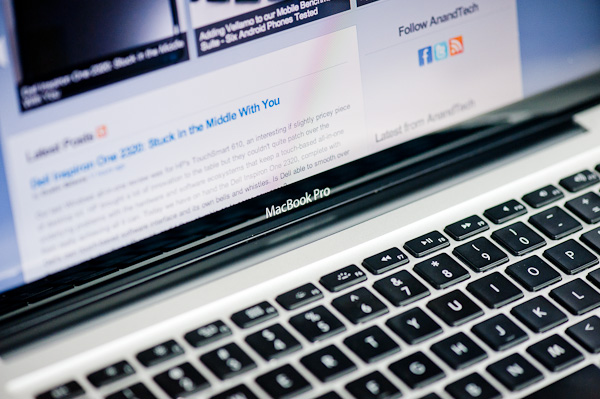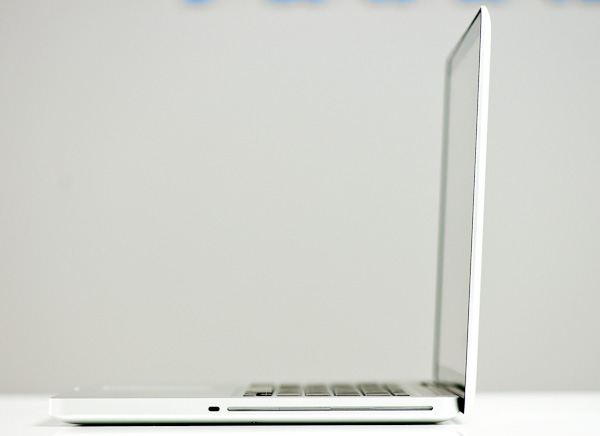Apple 15-inch MacBook Pro (Late 2011) Review
by Anand Lal Shimpi on November 17, 2011 5:10 PM EST- Posted in
- Mac
- Apple
- Intel
- MacBook Pro
- Sandy Bridge
- Laptops
Final Words
While I had a hard time recommending the base 15-inch MacBook Pro to users earlier this year, with the GPU upgrade I'm pretty happy with the $1799 configuration. It is pricey for sure, but if you can only have one Mac in your life and you like performance, it is probably the one to get.
The MacBook Air is nice but for demanding workloads it's not enough. The iMac is fast, but I'm not a fan of lugging around a 27-inch display with me wherever I go. The 15-inch MacBook Pro is honestly the best of both worlds. Obviously there are cheaper PC alternatives if you just need affordable compute, I'm speaking only to those users who have their sights set on something running OS X.
The only changes I'd make to the system are an upgrade in display resolution and the addition of an SSD. Both are options that Apple offers, and with the latter you can always handle that upgrade on your own.
At some point Apple will have to outfit these things with SSDs standard, similar to the MacBook Air. There's such a huge difference in user experience that it only makes sense to, the question is when?
For a while now we've heard rumors of a thinner, redesigned MacBook Pro without an optical drive. Removing the optical drive alone isn't enough to significantly decrease the thickness of the machine, Apple would have to move away from the 2.5" HDD form factor as well. Given that there are no reasonable performing HDDs in a smaller form factor, one would assume that if and when Apple removes the optical drive from the MacBook Pro, it will also remove the hard drive.
Ivy Bridge would be an interesting time to make such a drastic move, as Intel's 22nm process should be able to significantly reduce power consumption. Although the time may be right from a processor perspective, I wonder whether the MacBook Pro audience would be fine with only 128GB or 256GB of storage.
There is of course another option: expand the MacBook Air line with a larger (thicker?) 15-inch model. The trick here would be cramming a 35W quad-core chip into the system, otherwise it just becomes a 13-inch MBA with a bigger screen. That's where the thicker comment comes into play. Currently the MacBook Air only has to worry about dissipating 17W from the CPU, which includes the GPU. The 15-inch MacBook Pro however has a 45W quad-core CPU and a discrete GPU. Ivy Bridge will significantly increase integrated graphics performance, but not enough to truly eliminate the need for a discrete GPU. I suspect for Apple to do the ultra thin 15-inch MacBook Pro the right way it would have to wait until Haswell, where integrated graphics performance is supposed to be much better.
Of course all of this is speculating out loud, anything (or nothing) could happen. If you need a system today, the upgraded MacBook Pro line makes an an already great system a better value. If you can wait, Ivy Bridge will likely be very good for notebook users in about 6 - 8 months.
That's the downside to Intel's tick-tock cadence. When the ticks and tocks are major, there's almost never a good time to buy. Ivy Bridge will significantly reduce power consumption and improve GPU performance and then there's Haswell...
The next two years aren't going to be easy on anyone's wallet.












101 Comments
View All Comments
gradjoh - Thursday, November 17, 2011 - link
If I read the charts correctly, then the new "late 2011" model is slower in every category than the "early 2011" model??Zellias - Thursday, November 17, 2011 - link
Since when have mac users been focused on performance? If you're concerned about performance buy a PC and save yourself some time and money.KoolAidMan1 - Thursday, November 17, 2011 - link
High end MBPs have generally been on the high end of performance. Fanboys threw a shitfit a few years ago when PCMag rated the MBP as the fastest PC laptop, barely edging out an HP (I think it was an Elitebook).You're paying for that performance in a thin and light package with good battery life. Compromise on any of those as well as the display, the keyboard, and the trackpad, and it's easy to get a cheaper laptop from someone else.
arterius2 - Thursday, November 17, 2011 - link
Bug off iFanyboy, fastest PC laptop? you make me laugh, my 2 year old Asus G73 with an intel SSD rapes the living sh1t out of this POS. I been playing Starcraft II @ 1920x1080 on high setting with 40+fps with this laptop at less than half the price of the macbookpro.thin and light package? do you even know the crap you spew out of your mouth? macbook pro is far from light, in fact its quite heavy for its class due to being carved entirely out of a block of metal.
Flunk - Thursday, November 17, 2011 - link
Nice troll, missing the point entirely is the way to go!KoolAidMan1 - Thursday, November 17, 2011 - link
Wow, so mad!See, this is what I talk about when it comes to angry fanboys. Newsflash: these machines all have most of the same guts, a quad core i7 in my case.
And my POS MBP runs Starcraft 2 at over 60fps on high and over 200fps on low (pro style) at the same resolution.
As far as weight goes, 5.6 lbs is extremely light given that notebooks with the same display size and power are generally over 6lbs and generally around 8lbs.
GG
KoolAidMan1 - Thursday, November 17, 2011 - link
Also, there seem to be serious reading comprehension issues here. The PCMag example I gave was ONE example where the MBP (I believe it was the Penryn launch) was actually the fastest notebook for a time. Obviously it isn't always the fastest, thermal limitations and the chassis size are always going to place a limit on that.The point still seems to stand though, say that the 15" MBP is actually fast hardware, or sometimes even the fastest, and some people go ballistic.
JarredWalton - Friday, November 18, 2011 - link
The MBP has never been the fastest notebook around. Ever. It has (debatably) been one of the best built and equipped laptops, but fastest? Penryn MBPs were released around the time when other high-end laptops were going to Core 2 Extreme or at least T9500. The only way an MBP is "fastest" is if you arbitrarily eliminate faster contenders. Consider these two reviews (within a couple days of each other):Dell XPS M1730:
http://www.anandtech.com/show/2461
MBP 15 Penryn:
http://www.anandtech.com/show/2459
The XPS M1730 smokes the MBP 15 in performance (not that we did Apples to apples tests of the two, but you can just look at the specs to see where Apple is less than the XPS), thanks to the GPUs and faster CPU. Again, this is not to say that an MBP isn't potentially "best", or "best battery life", but "fastest"? Don't make me laugh.
KoolAidMan1 - Friday, November 18, 2011 - link
As I said, that was the result of a PCMag review that rounded up several other laptops in its comparison.As I also said in another response in this thread, it obviously wasn't the fastest forever, the whole point of that story is that people got up in arms over such a favorable review, just as it happens every time Anand posts a good review of an Apple product.
That is all.
I wouldn't dare call MBPs the fastest laptops around, if I wanted that I would be sacrificing battery life and size for the extra TDP that the faster CPU and GPU generate. This is obvious, but again it is an anecdote about the review used to make a point about how angry some people can get on the internet because some notebooks have a fruit shaped loge on the case.
JarredWalton - Friday, November 18, 2011 - link
PC Mag. 'nuf said. ;-)I get the same vibe when I read modern hardware reviews in PC Gamer magazine; it's like the companies are just paying for the reviews to be favorable. "Oh, it's an Alienware? 95% and Editor's Choice!" Okay, we like the M17x and M14x (and to a lesser extent the M11x R3), but the M18x just feels like too much. /tangent